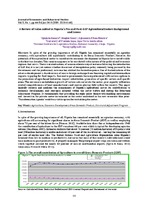| dc.contributor.author | Kanayo, Ogujiuba | |
| dc.contributor.author | Stiegler, Nancy | |
| dc.contributor.author | Maurice, Ogbonnaya Ufiem | |
| dc.date.accessioned | 2017-06-05T08:07:06Z | |
| dc.date.available | 2017-06-05T08:07:06Z | |
| dc.date.issued | 2013 | |
| dc.identifier.citation | Kanayo, O. et al. (2013). A Review of Value Added in Nigeria’s Pre and Post–SAP Agricultural Sector: Background and Issues. Journal of Economics and Behavioral Studies, 5 (1): 44-56 | en_US |
| dc.identifier.issn | 2220-6140 | |
| dc.identifier.uri | http://hdl.handle.net/10566/2919 | |
| dc.description.abstract | In spite of the growing importance of oil, Nigeria has remained essentially an agrarian economy, with agriculture still significantly contributing to its Gross Domestic Product. However, the potentials of the agricultural sector to contribute to economic development in Nigeria have varied widely in the last two decades. This variation appears to be correlated to the nature of the political and economic regimes that exists. There were indications of some moderate output increase following the introduction of SAP. But, it is not yet certain whether the extent of deregulation policy currently being pursued by the Government and the preliminary outcome has elicited the desired response. One of the indications of the adverse development is the diversion of scarce foreign exchange from financing capital and intermediate imports to paying for food imports. Successive governments have experimented with various options in the promotion of agro-based industries, import substitution, promotion of specific sectors and specific areas. The outcome is an imbalance growth of various sub-sectors in the sector, poor capacity utilization, eroded competitiveness of local manufacturers and uneven playing field within the country. This paper basically reviews and analyzes the components of Nigeria’s agricultural sector, its contributions to economic development, and strategies adopted within the sector before and during the Structural Adjustment Program. It recommends that providing the right policy framework/enabling environment and incentives for private sector investment in the sector enshrined in the new economic blue print‘Transformation Agenda’ could be a viable option for revitalizing the sector. | en_US |
| dc.language.iso | en | en_US |
| dc.publisher | International Foundation for Research and Development (IFRD) | en_US |
| dc.rights | Publisher retains copyright. Authors may archive the published version in their Institutional Repository. | |
| dc.subject | Agriculture | en_US |
| dc.subject | Economic development | en_US |
| dc.subject | Gross domestic product | en_US |
| dc.subject | Structural adjustment program | en_US |
| dc.title | A Review of Value Added in Nigeria's Pre and Post-SAP Agricultural Sector: Background and Issues | en_US |
| dc.type | Article | en_US |
| dc.description.accreditation | Department of HE and Training approved list | |

